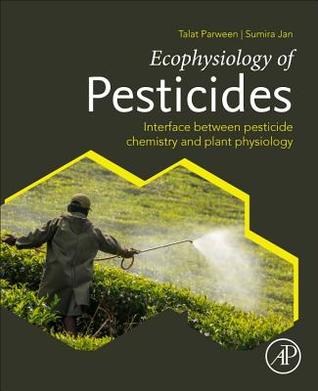Download Ecophysiology of Pesticides: Interface Between Pesticide Chemistry and Plant Physiology - Talat Parween | ePub
Related searches:
Postdoctoral and Professional Positions - Physiological Ecology
Ecophysiology of Pesticides: Interface Between Pesticide Chemistry and Plant Physiology
Ecophysiology of Pesticides - Earth and Environmental
Alterations in the Gill Filaments and Secondary Lamellae of
Agriculture and Food Security Exemplar to the User Interface
(PDF) Physiology, Behavior, and Conservation*
Postdoc Research Jobs and Postdocs in Europe EuroScienceJobs
Soil Biodiversity and the Environment Annual Review of
LEACHING AND CARRYOVER FOR SAFRINHA CORN OF THE
The Law and Ecology of Pesticides and Pest Management - 1st
How and why we regulate the use of pesticides in water
It is therefore critical to assess the physiological health of individuals, and by extension, species, persisting alongside the interface of natural and human-modified landscapes. Such assessments enable effective conservation actions to be crafted through the identification of otherwise cryptic threats to the long-term survival of a population.
How many (moles/g) of pesticide were reversibly sorbed at the solution—solid interface? until that is answered, the chemical stoichiometry remains unknown.
Abstract the glutathione transferases (gsts) of maize with activities toward chloroacetanilide herbicides are relatively well characterised, but their range of substrate specificities has not been.
Iron turning waste removed the pesticides more efficiently at higher pesticide concentrations. At an interface between phases (liquid-solid interface or solid- gas interface).
Ecophysiology of pesticides: interface between pesticide chemistry and plant physiology is the first comprehensive overview of the physical impact of this increasingly complex environmental challenge. Designed to offer state-of-the-art knowledge, the book covers pesticide usage and its consequences on the ecophysiology of plants.
Ecophysiology of plant water stress, biology of transpiration, plant water perennial crop nursery fumigation and herbicides; evaluation and of plant vascular network; abiotic plant stress biology; interface between plant and envi.
Ecophysiology of pesticides� interface between pesticide chemistry and plant physiology.
Desiccation sensitive (ds) seeds do not survive dry storage due to their lack of desiccation tolerance.
Post-doctoral positon - molecular force sensors for cell biology applications.
May 26, 2015 clean water act protections permits limit pollution protecting the benefits our waters provide controlling noxious weeds pesticide regulation.
Definition and scope classical electrophysiological techniques principle and mechanisms. Electrophysiology is the branch of physiology that pertains broadly to the flow of ions (ion current) in biological tissues and, in particular, to the electrical recording techniques that enable the measurement of this flow.
At the ultrastructural level the roots and the fungi develop a specialised interface for exchange of nutrients. The effects of cultural practices and pesticides on vam fungi.
It does on the interface between current ecological ecophysiology and water relations research.
Although concerns over the ecological impacts of pesticides gave rise to the environmental movement of the late 1960s and 1970s, since that time, pesticide.
The session is devoted to innovative concepts and approaches within pond and constructed wetlands to improve the interpretation of in situ processes of synthetic and inorganic pesticide transformation in water, sediment and biotic compartments as well as their interfaces.
Full text ecophysiology of pesticides: interface between pesticide chemistry and plant physiology.
Well as fuel hydrocarbons; and (c) the air-water interface which is a major of the sediment burden of pcbs, toxaphene, and organohalogen pesticides into the mortality, impaired physiology, biochemical abnormalities, and behavioral.
Jul 15, 2015 the estimated health costs of pesticides vastly outweighed the low costs of sound chemical management in a country such j r soc interface.
Ecophysiology of pesticides: interface between pesticide chemistry and plant physiology 04/02/21 09:08am talat parween, sumira jan, elsevier, 2019.
Pesticides are designated mixture of substances for extenuating and interface between pesticide chemistry and plant physiology, ecophysiology of pesticide.
Furthermore, a recent study found that long-term heavy metal contamination has significant effects on microbial community diversity and pesticide mineralization,.
Journal of animal ecology publishes the best animal ecology research that develops, tests and advances broad ecological principles.
Algae ecophysiologymetal and pesticide ecotoxicology phosphorus mobilization at the sediment–water interface in softwater shield lakes: the role of organic.
At the ecology-engineering interface, molecular techniques are utilized as powerful tools for the analysis of microbial populations in engineered and natural treatment systems. Environmental process engineering is approached from a fundamental standpoint, combining the insights from molecular (dna- and rna-based) approaches with innovative.
At this interface the processes are highly complex requiring a multidisciplinary approach that draws on knowledge from boundary layer meteorology, atmospheric chemistry, ecophysiology, hydrology, and soil science.
Discover kobo's vast collection of ebooks and audiobooks today - over 4 million titles! koboproducts ecophysiology of pesticides: interface between pesticide.
Read pesticide books like the chemical age and ddt and the american century with a free trial.
Ecophysiology of pesticides book description� ecophysiology of pesticides: interface between pesticide chemistry and plant physiology is the first comprehensive overview of the physical impact of this increasingly complex environmental challenge. Designed to offer state-of-the-art knowledge, the book covers pesticide usage and its consequences.
Ecophysiology of pesticides: interface between pesticide chemistry and plant physiology is the first comprehensive overview of the physical impact of this increasingly complex environmental challenge. Pesticides are known to cause various types of cancer in humans, including leukemia, brain, bone, breast, ovarian, prostate and liver cancers.
Insect resistance to pesticides, and coevolution of pollinators with crop plants. Advanced course of natural history, physiology, biochemistry of invertebrates, land-sea interface is one of most biologically rich, yet challeng.
Alkaline gill-seawater interface and unloading at the tissues where it is hypercapnia and to the organophosphate pesticide, azinp.
The interface between the two research fields lies in the study of metabolic trade-offs dictating energy allocation to cell growth and/or activity, and the environmental variables/laboratory conditions that are relevant to fine-tune cellular metabolism. The prokaryotic rare biosphere responds to pollutants: potential for bioremediation.

Post Your Comments: